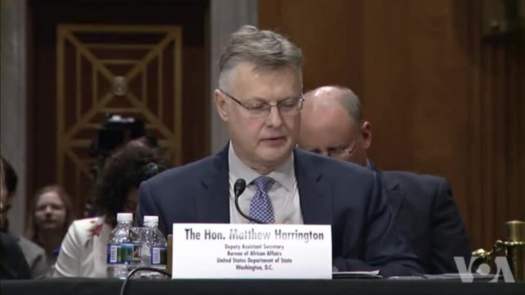
By Dorrothy Moyo| The US Deputy Assistant Secretary of State for Africa Matthew Harrington, has told the Centre for Strategic and International Studies (CSIS) in Washington, has said that ZANU PF President Emmerson Mnangagwa should repeal laws which suppress the media.
He also said there will not be a removal of sanctions until for instance the soldiers who shot and killed civilians on the 1st August 2018 are tried.
While saying there was some improvement in the 2018 elections, compared to previous years, he emphasised saying “any goodwill from the international community that might have been generated by an improved election process dissipated as a result of several problematic developments,” referring to the 1 August brutality.
He also spoke against the military brutality of January – February 2019.
He said, “in addition, in January and February (2019) the army launched a sustained crackdown on citizens in response to their protests over fuel price increases.”
“We welcome a better relationship with Zimbabwe, but the ball is very much in the Zimbabwean government’s court. If there’s real, concrete progress in the areas laid out in the ZDERA legislation, Zimbabwe will find a committed partner in the United States.”
Meanwhile, he was opposed by Emmerson Mnangagwa’s advisor, Ashok Chakravarti, who said the US sanctions have created a problem of negative perception against Zimbabwe.
He said, “Zdera does make a difference to trade and commercial flows, not legally. International markets don’t necessarily work purely on the laws in place. Perception is terribly important…
“Some years ago, we had 40 correspondent banks which dealt with Zimbabwe. It’s a fact that there are only about half a dozen banks that are willing to do business with Zimbabwe now because of the perceived risks. It has nothing to do with whether there’s a specific law in place.”
Chakravarti added saying his child who is studying in the US’s fee payments were blocked because the money was detected as coming from Zimbabwe.
Responding to him however, Harrington said Zimbabwean politicians were not genuine.
Harrington said “the government are saying some of the right things but it is falling short when it comes to concrete actions. There are some steps the government could take to demonstrate it is serious about improving rule of law and respect for human rights in Zimbabwe.
“It could repeal POSA (Public Order and Security Act) and AIPPA (Access to Information and Protection of Privacy Act), two laws long emblematic of a repressive regime. It could stop using the army to harass and intimidate citizens who exercise their fundamental right to free speech, and it could hold accountable those members of the security services who have abused their fellow citizens,” he firmed up.
He added: “Those simple actions would send a strong signal to Zimbabweans and the international community that Zimbabwe is on a very different path and genuinely committed to embracing democratic institutions and values, and to becoming a more responsible member of the international community. And not one of those steps, I would point out, requires outside assistance. The government could take any one of them today. The fact that it has chosen not to do so raises questions about the genuineness of its commitment to put the country on a much different trajectory.”


